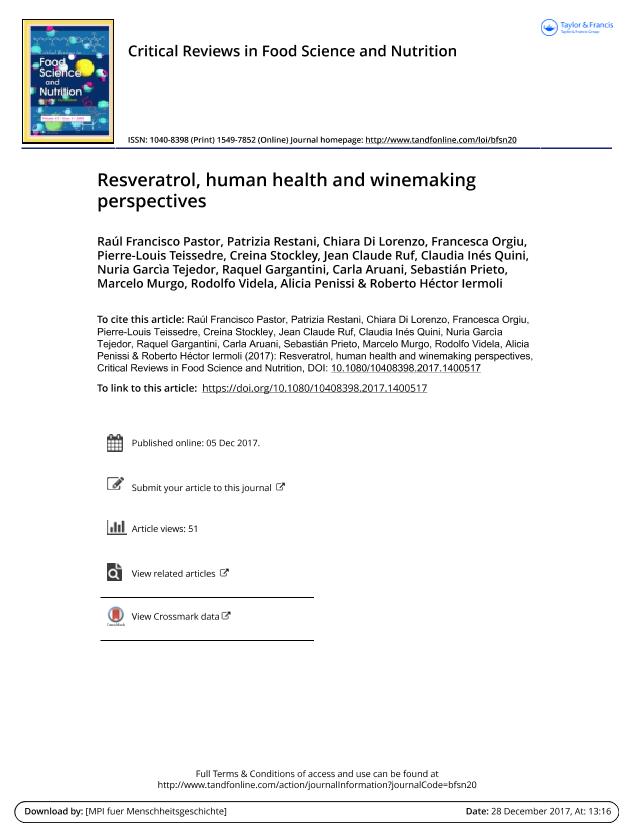Artículo
Resveratrol, human health and winemaking perspectives
Pastor, Raúl Francisco; Restani, Patrizia; Di Lorenzo, Chiara; Orgiu, Francesca; Teissedre, Pierre Louis; Stockley, Creina; Ruf, Jean Claude; Quini, Claudia Inés; Garcìa Tejedor, Nuria; Gargantini, Raquel; Aruani, Carla; Prieto, Sebastián; Murgo, Marcelo; Videla, Rodolfo; Penissi, Alicia Beatriz ; Iermoli, Roberto Héctor
; Iermoli, Roberto Héctor
 ; Iermoli, Roberto Héctor
; Iermoli, Roberto Héctor
Fecha de publicación:
05/12/2017
Editorial:
Taylor & Francis
Revista:
Critical Reviews In Food Science And Nutrition
ISSN:
1040-8398
e-ISSN:
1549-7852
Idioma:
Inglés
Tipo de recurso:
Artículo publicado
Clasificación temática:
Resumen
Resveratrol, (3, 5, 4´-trihydroxystilbene) is a non-flavonoid polyphenol stilbene synthesized by plants when damaged by infectious diseases or ionizing radiation. Although present in more than seventy plant species, grapes and wine are the major dietary contributors of resveratrol, responsible for 98% of the daily intake. In 1992, Renaud and De Lorgeril first linked wine polyphenols, including resveratrol, to the potential health benefits ascribed to regular and moderate wine consumption (the so called "French Paradox"). Since then, resveratrol has received increasing scientific interest, leading to research on its biological actions, and to a large number of published papers, which have been collected and discussed in this review. The relatively low amounts of resveratrol measured in wine following moderate consumption, however, may be insufficient to mitigate biological damage, such as that due to oxidative stress. On this basis, the authors also highlight the importance of viticulture and the winemaking process to enhance resveratrol concentrations in wine in order to bolster potential health benefits.
Palabras clave:
Resveratrol
,
Wine And Health
,
Oxidative Stress
,
Winemaking
Archivos asociados
Licencia
Identificadores
Colecciones
Articulos(IHEM)
Articulos de INST. HISTOLOGIA Y EMBRIOLOGIA DE MEND DR.M.BURGOS
Articulos de INST. HISTOLOGIA Y EMBRIOLOGIA DE MEND DR.M.BURGOS
Citación
Pastor, Raúl Francisco; Restani, Patrizia; Di Lorenzo, Chiara; Orgiu, Francesca; Teissedre, Pierre Louis; et al.; Resveratrol, human health and winemaking perspectives; Taylor & Francis; Critical Reviews In Food Science And Nutrition; 5-12-2017; 1-19
Compartir
Altmétricas



